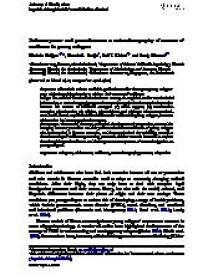Between power and powerlessness: a meta-ethnography of sources of resilience in young refugees
Objective. This article reviews available qualitative studies that report young refugees’ ways of dealing with adversity to address their sources of resilience.
Design. We searched five electronic databases. Twenty-six empirical studies were included in the review. A meta-ethnography approach was used to synthesize these qualitative studies.
Results. Six sources of resilience emerged: (1) social support, (2) acculturation strategies, (3) education, (4) religion, (5) avoidance, and (6) hope. These sources indicated social as well as personal factors that confer resilience in young refugees, but most of them also had counterproductive aspects.
Conclusion. The results, from an ecological developmental perspective, stressed the interplay between protective and risk processes in the mental health of young refugees who had resettled in Western countries, and they emphasized the variability as well as the universality of resilience-promoting processes. Further research is needed to explore the cultural shape of resilience and the long-term consequences of war and migration on young refugees.
Geachte bezoeker,
De informatie die u nu opvraagt, kan door psychotraumanet niet aan u worden getoond. Dit kan verschillende redenen hebben,
waarvan (bescherming van het) auteursrecht de meeste voorkomende is. Wanneer het mogelijk is om u door te verwijzen naar de bron
van deze informatie, dan ziet u hier onder een link naar die plek.
Als er geen link staat, kunt u contact opnemen met de bibliotheek,
die u verder op weg kan helpen.
Met vriendelijke groet,
Het psychotraumanet-team.
Reference:
Marieke Sleijpen, Hennie R. Boeije, Rolf J. Kleber, & Trudy Mooren | 2015
In: Ethnicity & health, ISSN 1465-3419 | juni
http://www.tandfonline.com/doi/abs/10.1080/13557858.2015.1044946
In: Ethnicity & health, ISSN 1465-3419 | juni
http://www.tandfonline.com/doi/abs/10.1080/13557858.2015.1044946


